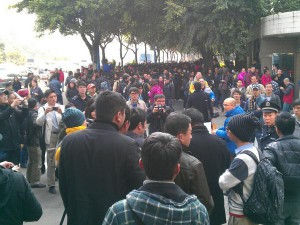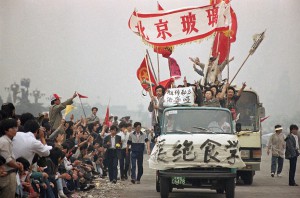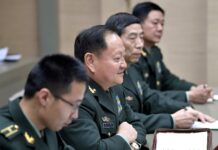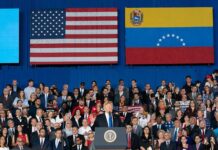Open letter from 70 intellectuals warns of “violent revolution” without a change of course
chinaworker.info
Warnings of revolution in China are coming thick and fast as Xi Jinping and his new leadership team take the helm. An open letter calling for political reforms, signed by more than 70 Chinese intellectuals and lawyers, was circulated on the internet at the end of 2012. “China runs the risk of revolution and chaos if it does not change,” said Peking University law professor Zhang Qianfan, the petition’s main organiser. Other signatories include Zhang Sizhi, who was the defence lawyer for Mao Zedong’s widow, Jiang Qing, at her trial in 1981.
This is the latest pubic foray by the bourgeois liberal wing of the ‘Communist’ (CCP) regime. In the view of this wing, capitalist policies should be accompanied by a partial and controlled political opening, whereas the dominant wing of the CCP favours capitalist economics but rejects any real relaxation of authoritarian controls.
The petition’s authors admit their specific proposals are “rather moderate”. They do not demand the end of one-party rule, but instead advocate top-down and gradual “reform”, including now familiar calls for a free press, independent judiciary and more support to private enterprise. As we have explained previously on chinaworker.info, such proposals are a far cry from any democratic agenda, and rather reflect the liberals’ wish to build some political “safety valves” into China’s dictatorial system, and encourage “freer competition” in the economy – steps they hope will prevent a social explosion, a prospect they recognise as more and more likely.
“We’d rather have reform instead of revolution, because that would cost the least,” declared one of the signatories, Zhang Lifan. He then contradicted his own ‘low cost’ argument telling Associated Press, “We are treating a dead horse [political reform] as if it were still alive.”
The authors make clear they want to avoid revolutionary change in China, a prospect they clearly view with horror. Despite its “moderation” the petition was quickly expunged from cyberspace by government censors.
Media crackdown
Marking a wider sweep against calls for political reform, the website of well-known liberal magazine, Yanhuang Chunqiu, was closed down on January 4 by propaganda officials in Beijing. The banning order came just days after the magazine had echoed the petition’s sentiments in an editorial calling for China’s constitution to be “protected”.
In a separate but related development, the Guangdong-based liberal newspaper Southern Weekly had its editorial axed and rewritten by provincial propaganda boss Tuo Zhen, because the original piece called for the realisation of the “dream of constitutionalism in China”. A group of Southern Weekly journalists have protested at this censorship in the one province where the media is seen to be less of a mouthpiece for the dictatorship.
At the time of writing, some journalists are reported to have taken strike action after the newspaper’s management took control of microblog accounts and published statements supporting the government’s version of events. This is the first strike by media employees since 1989 and deserves the full support of all who are fighting for democratic rights, as an excellent example of how this struggle must be conducted. The journalists’ action has generated an outpouring of solidarity on the internet from across the country. The current protests in solidarity with the Southern Weekly staff are already raising democratic demands that go beyond the limited prescriptions of the liberal reformers and petitioners.
In global rankings for press freedom compiled by Reporters Without Borders, China was 174th of 179 countries in 2011-12. The Financial Times Beijing-based reporter Kathrin Hille described the latest developments as an “unexpectedly tough political stance” by the new CCP leadership. But in fact this is entirely consistent with statements by party leader Xi Jinping that “stability is the prerequisite for reform”. Liu Yunshan, responsible for censorship within the ruling politburo, reiterated that the media must “better reflect the messages of the party and the government”.
While liberal sections of the media are the current target of official censorship, they are not alone. Last year the regime struck against left wing and Maoist-inspired sites, some of which defended the purged princeling Bo Xilai. And this year marks the fifth year that chinaworker.info, which stands for genuine socialism and opposes all wings of the CCP dictatorship, has been banned in China. Our site is only accessible by using virtual private networks (VPNs), which have also recently been targeted under new internet controls. In yet another tightening measure, a law was passed on December 28 requiring real-name registration of internet subscribers. There are no signs the new CCP leaders, who have pledged “deeper economic reform”, will embark on even the very limited political opening that the petitioners advocate.
“Violent revolution”
Entitled “Proposal for a Consensus on Reform” the petition of the 70 warns of the dangers of inaction. “If reforms to the system urgently needed by Chinese society keep being frustrated and stagnate,” it states, “then official corruption and dissatisfaction in society will boil up to a crisis point and China will once again miss the opportunity for peaceful reform, and slip into the turbulence and chaos of violent revolution.”
The author’s fears are well founded, even if their ‘solutions’ are either inadequate or mistaken or both. Last month a government think tank reported China’s Gini coefficient, a widely used measure of inequality, reached 0.61 in 2010, placing it on a par with South Africa. The capitalist policies of the CCP have created more billionaires than any country apart from the United States, while 500 million people still live on less than 2 US dollars a day. A recent survey revealed that the top ten percent of China’s population own 85 percent of household wealth, whereas in the US the top tenth own 75 percent.
In our article ‘What changes can we expect from Xi Jinping?’ published on chinaworker.info on December 28, we explained that the serious splits which have opened within the CCP regime foreshadow revolutionary upheavals in the period ahead. Two months into their term of office, the new CCP leaders seem to sense the growing danger to their system, but at the same time are taking measures to shore up one-party rule, rather than democratise.
At the time of the CCP’s 18th Congress in November a poll was published in the Global Times, a regime mouthpiece, showing that 81 percent of respondents supported political reform. The same poll showed that around 70 percent wanted stronger action against corruption.
In a more recent article, the same journal summarised the regime’s rationale for rejecting the current calls for political reform: “In next 20 to 30 years, China’s development and reform will be synchronized and symbiotic. Without reform, China cannot develop. And the reason why we need so much time to carry out reform is that social transition needs a long time. China’s reform should be a step-by-step process.”
This ‘step-by-step’ argument is a subterfuge, which today fewer and fewer people are falling for. It is devoid of any historical examples to show why “a long time” is needed. Moreover, in recent years the regime has shifted towards more rather than less repressive measures. The CCP tops, especially the dominant princeling families, have amassed enormous financial empires, which are protected and largely hidden by the one-party dictatorial system. This explains their resistance to change. The regime also fears that granting even partial civil rights and freedoms could open a ‘Pandora’s Box’ by triggering mass movements demanding real democratic change.
The regime’s hardliners and their liberal critics are united in their fear of the masses, by the spectre of “chaos” and “violent revolution”, and in their support for capitalist policies. They both realise that China’s capitalist development will be threatened when the vast super-exploited working class gains political freedoms and is able to build powerful independent organisations. Where they disagree is over how to prevent such a development.
Anti-corruption “sideshow”
These fears also explain the limited effects, in real terms, of the regime’s much-hyped crackdown on corruption. The new leaders, as with their predecessors a decade ago, are selecting and punishing a small ‘quota’ of corrupt officials in order – they hope – to satisfy popular anger. But they fear to go further than this, even though doing so would deliver significant political and economic benefits. Exposing the full extent of corruption in China would threaten the regime’s existence, and in the process would probably unleash all-out civil war between embattled and equally corrupt CCP factions.
“China’s anti-corruption drive is a sideshow”, was the headline of a Financial Times article on 3 January, making a similar point. This article noted that international financial speculators are betting against reduced corruption in China: “Hedge fund managers who like luxury goods as a proxy for the growth of corruption in China continue to hold the shares of companies such as Richemont and Prada. Mainland sales of watches and jewellery may go down but sales offshore are likely to continue as prudent Chinese continue their extravagant purchases – just not in China itself.”
The petition states that democracy, rule of law and respect for human rights are “a global trend that could not be stopped”. This is an extremely naive view, which is unfortunately common among Chinese liberals, and misses the fact that all democratic gains have been won through mass struggle and political pressure, against the resistance of the old rulers, with the organisations of the working class as the decisive factor. This was the case in the struggle for civil rights and votes for Afro-Americans in the USA in the 1950s-70s, and also in the revolutionary battles that ended white minority rule in South Africa. Women’s suffrage was won by the mass pressure of women activists, socialist parties and trade unions in the period after the First World War. Most of Europe did not have elected governments until after the 1917 Russian Revolution, which emboldened the working class and terrified the ruling classes into granting concessions.
More recently in the unfinished revolutions in Egypt and Tunisia we again see the decisive role of trade unions and workers’ strikes in bringing down the previous dictatorships. In no country has authoritarian rule been replaced by basic democratic rights for the masses merely by petitioning the old rulers and appealing to their sense of humanity.
Democratic hypocrisy
Capitalist governments internationally, especially US imperialism which is engaged in strategic competition with the Chinese regime for economic and political hegemony in Asia, may make democratic sounding speeches, but they too fear any genuine movement for democratic change in China, understanding its revolutionary, anti-capitalist potential. US officials can express solidarity with the ideals of China’s ultra-cautious liberals and demand the release of one or other dissident (although only very occasionally in recent years). But these are secondary considerations as far as the US capitalists are concerned, subordinate to their economic interests. General Motors sells more cars in China than in the US, and Apple’s rise to pre-eminence in the tech sector is based on its mass sweatshop production in China. Muhtar Kent, chairman of Coca Cola, said recently that China is poised to overtake the US and Mexico to become the company’s biggest market.
In the regional tug-of-war for influence being fought out between Washington and Beijing, US politicians engage in hypocritical attacks on China’s authoritarian system, counterposing their own ‘dollar democracy’. This is to project so-called soft power towards the peoples of Asia as an antidote to China’s fast-growing economic clout. A closer look at US foreign policy shows it has installed and propped up murderous dictatorships around the world, and still today commits human rights atrocities such as its drone attacks in Pakistan and Afghanistan. The US government chooses its allies abroad not on the basis of whether they rule through a system of bourgeois democracy, but based on their usefulness to Washington’s strategic and economic aims. This approach has shaped US policy towards Beijing over more than three decades. It explains why, for example, after the Beijing massacre of 1989, the government of president George H W Bush made only token protests, but quickly resumed full economic and diplomatic relations with China. For the capitalists business comes first!
Lessons of 1989
We socialists agree with the open letter on one point – China is heading towards revolution, which is the result of the disastrous policies of the CCP dictatorship. But we reject their assumption, as if this is a historical law, that revolutionary change must be “chaotic” and “violent”. This depends very much on whether the masses and especially the working class have succeeded in building their own organisations, independent unions and a socialist party, which can offer a clear lead to the oppressed masses.
In 1989, the mass youth protests against the CCP dictatorship, later joined and supported by millions of ordinary workers, were a model of self-discipline and organisation. The horrific violence that was eventually used to crush that movement came from the side of reaction – ordered by the regime and the ‘architect of reform’ Deng Xiaoping.
While many commentators deny this obvious fact, 1989 was a revolutionary struggle, but unfortunately without a clear leadership and programme that could defeat the dictatorship. In our book about 1989, Seven Weeks That Shook the World, published by chinaworker.info in 2009, we analysed these events and explained how the existence of a revolutionary workers’ party could have led to the defeat of the regime and won the rank and file of the army over to the side of democratic socialist change.
More recently we have seen similar processes in the Arab world, with the mass upheavals in Egypt and Tunisia, where dictatorial regimes were toppled, but also in Bahrain, where the dictatorship clung to power using foreign troops and state terror against the people. In Egypt the police killed more than 800 people in their unsuccessful attempt to crush the mass movement against the dictator Mubarak. The revolution in Egypt has still not been completed, and the old privileged elite retain their control. These complications are the price the masses must pay for the absence at this stage of a revolutionary socialist mass party. To end one-party rule in China we must learn from these important international struggles and apply the lessons in terms of how to organise and what political programme is necessary.
What socialists stand for
Socialists and the chinaworker.info website stand for full and immediate democratic rights in China, which is a key difference that sets us apart from the liberal reformers. We understand that in order to win democratic rights the working class must take the leading role, by building its own organisations independently of both the one-party regime and the capitalists – domestic and foreign. These enemies of the working class have a common interest in prolonging the current totalitarian system.
Socialists stand for the end of one-party dictatorship, for freedom of political association, the right to form political parties and the immediate release of all political prisoners. We call for immediate free elections to a revolutionary constituent assembly, to replace the purely decorative and millionaire-dominated NPC and CPPCC. Elections should be based on universal suffrage for all over 16 years of age, and should be held more regularly than in Western so-called ‘democracies’ – every second year at least. Elected representatives should be subject to recall by their electorate and receive only a skilled worker’s salary. This revolutionary assembly should introduce a 40-hour working week without loss of pay, a national minimum wage of 3,500 yuan per month, massively increased funding for education, healthcare, and good quality public housing at low rents. The coercive one-child policy and hukou system should be repealed.
We demand an end to censorship, for a free press – but not the sham ‘free press’ that is dominated by private media tycoons, as is the case in Hong Kong and Western countries. We stand for generous state funding to all groups, in accordance with their support in society, who want to produce their own publications. We call for an end to state repression, the disbandment of the People’s Armed Police, and democratic control of the police through elected committees.
We stand for independent workers’ unions, for the right to strike, and for the right to organise nationally and across industrial sectors. These independent workers’ organisations should link together in democratic workers’ councils that should form the nucleus of a new and truly democratic system of government. We stand for democratic public ownership and planning of the major industries and companies according to need, not in the top-down bureaucratic manner of the CCP in its ‘socialistic’ period, the aim of which was to maintain its dictatorship.
There can be no genuine democracy if the economy is owned and controlled by billionaire cliques who use this economic power to direct government policy and enrich themselves. This is the unmistakeable lesson from the capitalist ‘democracies’ where in practise the big companies and banks exercise a dictatorship – witness the undemocratic austerity policies imposed upon the masses of Southern Europe today. Our alternative is a democratically elected workers and poor farmers’ government based on genuine socialism, to reorganise the economy and society to serve the needs of the majority.






